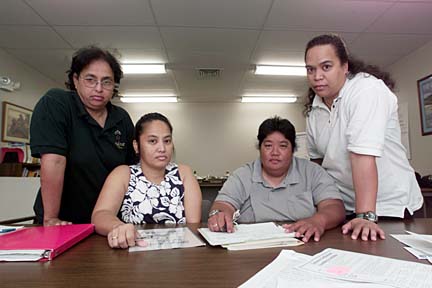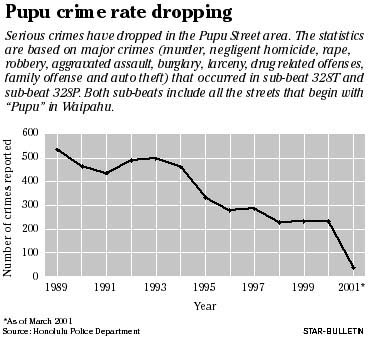


Pupu Street Dilapidated apartment buildings, drug trafficking and rubbish dumped along the curb.
dwellers break cycle
of social ills
Residents join forces to make
their troubled community saferPrograms to aid Pupu neighborhood
By Rosemarie Bernardo
Star-BulletinNearly 20 acres along the streets that begin with "pupu" in Waipahu are troubled: crime, domestic violence, noise disturbances and neglect.
"They don't deliver pizza there ... even if you pay them $50," said Kaleve Tufono, community development coordinator of the Queen Liliuokalani Children's Center.
Despite its reputation, crime in the Pupu Street community has declined since the early 1990s, according to the Honolulu Police Department.
With efforts of organizations, such as the Hawaii Team for Youth and Family and the Weed & Seed Program, volunteers, police officers and residents are working together to find a solution to clean up their community.
Lori Kim, security guard at Royal Guards Security, said people often gasp when she tells them she lives on Pupukahi Street.
"It's a good place," said Kim, an 11-year Pupukahi Street resident.
Due to the lack of green space, neighborhood children often play in the streets.
A group of women became angry after several children were injured by speedy drivers. Kim, along with several others who live in the Pupu neighborhood, formed the Hawaii Team for Youth and Family in April 1997 with the help of the Queen's Liliuokalani Trust.
Speed humps were installed on the streets to discourage speeding after the Hawaii Team lobbied City Council.
Currently, a basketball court, security lights and play apparatus are available for the children at the Pupuole Street Mini Park. Two volleyball courts are expected to be built this summer. If approved, Hawaii Team members hope to have a community garden for residents.

The Hawaii Team has played an active role by organizing monthly cleanups, youth activities and community cookouts."People are taking more pride in where they live and what they're doing," said Puni Chee, research assistant for Councilman John DeSoto, who assisted the Hawaii Team with several projects.
The density of the Pupu neighborhood has contributed to the social ills in the community, according to a report by research analyst Timothy Wong.
A cycle of social problems occurs in the area, said Tufono. From substance abuse to domestic violence, Tufono said, "It's like being in a hamster's wheel ... it's a vicious circle."
Because of low income, people are forced to live in that kind of environment, said Annette Yamaguchi, chairwoman of the Waipahu Neighborhood Board.
According to Wong's report for the Queen's Liliuokalani Trust, the city designated the Pupu Street area for medium-density multifamily zoning. However, the 1954 General Plan did not include specific land use control. Apartment buildings began to spring up one after another.
Between 1964 and 1975, there were 83 multifamily dwellings built in the Pupu neighborhood.
"Whenever you start crowding people together, you're also crowding all the problems and lack of income together," said Yamaguchi, who's been a Waipahu resident for nearly 40 years. "It's not what they choose. But it's what they can afford," said Yamaguchi. "What comes with social income comes social ills."
One of the reasons problems occur in the area is because of absent landlords, said Irene Elston, Pupunohe Street resident and Waipahu neighborhood board member. A majority of apartment dwellings are privately owned by landlords and investors. However, some of the buildings have been neglected and left to rot.
"With absent landlords, the tenants kind of take over," said Elston.
One of the organizations that stepped in to improve the Pupu neighborhood is the Weed & Seed program, a U.S. Department of Justice program administered by the U.S. attorney's office. Its strategy is to weed out criminals in the community and plant a seed of prevention, intervention and economic revitalization programs.
In September, Weed & Seed kicked off a program trying to rid the area of drug dealing by having officers patrol the streets in and around the Pupu neighborhood.
Residents in the community told police domestic violence goes often unreported, said Sgt. Aaron Farias, supervisor of the Weed & Seed Unit in District 3.
Officers in the Weed & Seed Unit have built a trust with residents. "Now, they tell us what's bothering them," said Farias.
"A lot of problems there are a product of the environment, which needs to be changed," he said. "The trash has to be cleaned up. The buildings need to be repaired."
Queen's community building specialist Randy Lee said, "It's a transient community." Fifty percent or more come and go, he said.
Rep. Nestor Garcia, who lived on Pupuole and Pupupuhi streets in the early 1970s, said he only has fond memories of growing up in the community.
"The community was safe back then, said Garcia. "You never had to worry about drugs, guns and violence."
"People looked out for each other," he said.
Involved in the Weed & Seed program, Garcia said, "It's my way of giving back and not forgetting where I came from."
Residents say there is still room for improvement. "You can't eradicate all the negative people in the world," Chee said. "But there's enough people who are thinking positive."
"There are good people wherever you go," Chee said. "There's good people in the Pupu area."
Organizations and programs assisting families and children in the Pupu neighborhood. Programs to aid Pupu neighborhood
>> Hawaii Team for Youth and Family: Created in April 1997. A nonprofit organization established primarily for low-income residents of the Pupu streets in Waipahu. The team is made up of staff members from the Queen Liliuokalani Children's Center, Health Promotion and Education Resources Section of the Hawaii State Department of Health and residents of the Pupu streets.
>> Blueprint for Change, The Neighborhood Place: Implemented in the Pupu Street community in 1998. A nonprofit organization that looks at children and families at risk of Child Protective Services, a treatment program or confinement.
>> Oahu Head Start: A comprehensive early childhood and care program for economically disadvantaged families with infants and children. It is funded by the Department of Health and Human Services.
>> Communities in Schools-HI, Project of YMCA: Created in Waipahu in 1990, the organization assists families with employment services and child care. Workshops on domestic violence and how to raise children also are available.
>> Weed & Seed Program: Initiated in September 2000, the program's strategy is to weed out the criminals and plant a seed of improvements in the community. The four key elements of the Weed & Seed strategy are law enforcement, community policing, prevention, intervention and treatment programs, and neighborhood restoration.
>> "Pupu" means marine or land shell in Hawaiian. Some 'Pupu' facts
>> A majority of residents are single householders.
>> 32 percent of the families are below the federal poverty level.
>> Forty percent of the population is comprised of those 18 years old and under.
>> One-third of the households in the Pupu Street community are on public assistance.
>> According to the 1990 U.S. Census, 83 percent of the community's housing stock are rentals with a median contract rent of $509 per month.
>> The Pupu Street community is a highly transient area. About 30 percent of the residents live in the same area for at least five years.
>> The community is made up of apartment dwellings, mostly two-story concrete structures containing an average of 18 residential units.
>> 7 percent of arrests made in Waipahu occur in the Pupu streets. Major offenses that occur in the Pupu neighborhood are larceny, family offense and burglary.
Source: Timothy Wong, research analyst with the Queen Liliuokalani Children's Center